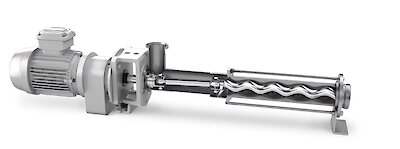 The offer is enormous, and a is bought quickly. However, caution is advised when purchasing so as not to experience a rude awakening afterwards. Especially in a hygienic environment, choosing the wrong pump can quickly lead to trouble and high costs. Therefore, some essential questions should be clarified in advance.
The offer is enormous, and a is bought quickly. However, caution is advised when purchasing so as not to experience a rude awakening afterwards. Especially in a hygienic environment, choosing the wrong pump can quickly lead to trouble and high costs. Therefore, some essential questions should be clarified in advance.
The hygienic industry covers a wide range of applications. From via concentrate to , everything is included. The consistency of the respective media also varies from almost water-like to highly viscous, sometimes even piecey. Since product safety is the top priority during the process, any contamination must also be excluded, and residue-free cleaning must be ensured. This makes the selection process for the right pump often very complex.
Key questions for selecting the right hygiene pump
To simplify the selection process, we have put together the most important questions for you together with our Business Field Manager, Rainer Gozzer:
 1. What are the characteristics of the medium to be conveyed?
1. What are the characteristics of the medium to be conveyed?
Viscosity (describes the flowability of a medium)
Shear sensitivity (negative change in media structure due to mechanical stress)
Particles (does the medium contain particles and, if so, in which size and consistency)
Abrasivity (to what extent does the medium have an abrasive effect and thus cause wear so that particular material combinations have to be used)
2. What is the structure of the pumped medium?
DM content (denotes the dry mass in a mixture of substances)
pH value (indicates how strongly a solution is basic or acidic)
Corrosivity (to what extent the medium reacts with the installed materials and thus causes harmful changes to them)
3. What are the technical process requirements?
Operating temperature
Suction side conditions (free inlet guaranteed or suction required)
Pumping pressure
Operating time
4. What are the individual requirements?
Hygienic requirements
Customer possibilities for cleaning the pump (CIP system available?)
Installation space (how much space is available for the pump?)
Required flexibility in terms of flow rate ranges as well as requirements regarding shaft sealings
Once these questions have been answered, the next step is to select the suitable pump model.
Hygienic applications: Progressing cavity pumps, multi screw pumps and rotary lobe pumps
The NETZSCH is particularly suitable for lumpy media, which must remain in their original form. The decisive factors here are the large conveying chambers and the gap-free design. As a result, there is very little, if any, backflow only at higher conveying pressures. In comparison, the progressing cavity pump provides the best results in terms of shear. It is also ideally suited for highly viscous media, such as cream cheese. A forced feed can push the medium into the stator inlet opening for further transport. Using specially matched materials for the rotor/stator combination (hard rotor with soft stator), the progressing cavity pump technology offers the best results when conveying abrasive media. In addition, it enables low-pulsation and thus very precise conveying, making it ideal for .
Compared to the progressing cavity pump, both the multi screw pump and the rotary lobe pump in the full-metal version can perform better in terms of operating temperature ranges. As a result, both are suitable for the so-called SIP process, a process in which the pump can be sterilized within the plant. Due to contactless conveying elements, rotary lobe and multi screw pumps offer high product safety with low wear. With the suitable shaft seal configuration, they are mainly insensitive to dry running. In addition, the NETZSCH and the NETZSCH offer a so-called Full Service in Place design, which enables simple and fast maintenance without removing the pump from the system. However, the two technologies do differ in some aspects.
The is characterized by very easy cleaning. Multi screw pumps can be operated at very high speeds. The cleaning medium can be conveyed through the pump very quickly, thus cleaning it efficiently. There is no need for an additional cleaning pump. The use of different pairs of spindles allows the application for different flow rate ranges. Screw pumps are also characterized by low-pulsation delivery and are thus also suitable for dosing applications.
Compared to the other two models, the compact design of the makes it ideal for systems with limited space. Its smooth design, surface-cooled or water-cooled motors, and lubricant-free synchronization of the rotary pistons make the pump predestined for use in cleanroom areas. Any contamination is excluded.

